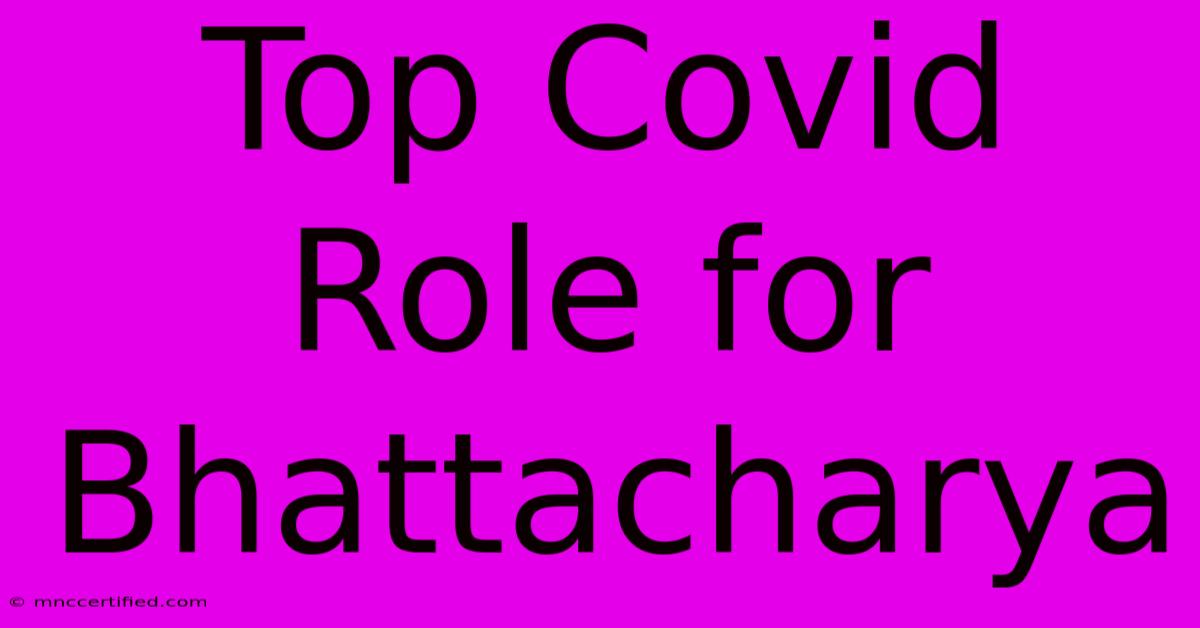Top Covid Role For Bhattacharya

Table of Contents
Top COVID Role for Bhattacharya: Navigating the Pandemic's Scientific Leadership
The COVID-19 pandemic thrust numerous scientists into the global spotlight, their expertise shaping public health responses and influencing policy decisions. Among these prominent figures, Dr. Jay Bhattacharya's role deserves particular scrutiny. While his contributions have been significant, they've also been highly controversial, sparking intense debate within the scientific community and the public at large. This article explores Bhattacharya's key contributions during the pandemic, analyzing his influence and the controversies surrounding his perspectives.
Bhattacharya's Early Contributions and the Great Barrington Declaration
Early in the pandemic, Bhattacharya, a professor of medicine at Stanford University, became a vocal proponent of what became known as "focused protection." This strategy, outlined in the controversial Great Barrington Declaration (GBD), argued against broad lockdown measures, suggesting instead that the focus should be on protecting vulnerable populations while allowing others to develop natural immunity through infection. The GBD, co-authored by Bhattacharya, garnered significant media attention and public support, particularly among those frustrated with stringent lockdown policies. Key words: Great Barrington Declaration, focused protection, COVID-19 response, lockdown policies, natural immunity.
His arguments centered around several key points:
- The disproportionate impact of COVID-19 on vulnerable populations: Bhattacharya emphasized that the mortality risk from COVID-19 was significantly higher for older individuals and those with pre-existing health conditions.
- The economic and social costs of lockdowns: He highlighted the negative consequences of broad lockdowns on mental health, education, and the economy.
- The potential for herd immunity through infection: A controversial aspect of his approach, this idea posited that allowing the virus to spread through less vulnerable populations would eventually lead to herd immunity, mitigating the pandemic's overall impact.
Criticisms and Controversies Surrounding Bhattacharya's Approach
Bhattacharya's views faced significant criticism from the outset. Many epidemiologists and public health experts argued that his approach was overly simplistic, potentially leading to a surge in cases and deaths, particularly among vulnerable groups. Keywords: COVID-19 mortality, herd immunity controversy, public health criticism, epidemiological modeling.
The main criticisms included:
- Underestimation of COVID-19's severity: Critics argued that Bhattacharya underestimated the virus's potential to cause severe illness and death in a broader range of individuals than initially anticipated.
- Lack of robust scientific evidence: The GBD was criticized for its lack of rigorous scientific backing and its reliance on modeling that was subsequently questioned.
- Ethical concerns: Allowing the virus to spread through less vulnerable populations raised significant ethical concerns about the potential for preventable deaths and long-term health consequences.
Bhattacharya's Continued Influence and Ongoing Debates
Despite the controversies, Bhattacharya's views have continued to influence public discourse and policy debates surrounding COVID-19. His work highlights the complexities of pandemic management and the challenges of balancing public health goals with economic and social considerations. Keywords: COVID-19 policy debate, pandemic management strategies, scientific dissent, public health ethics.
Ongoing discussions still revolve around:
- The long-term effects of COVID-19: The emergence of long COVID has added another layer of complexity to the debate, highlighting the potential for lasting health consequences even among those with mild initial infections.
- The effectiveness of various mitigation strategies: Ongoing research continues to refine our understanding of the effectiveness of different pandemic response strategies, such as lockdowns, mask mandates, and vaccination campaigns.
- The role of scientific communication and public trust: The pandemic has highlighted the critical importance of clear, accurate, and accessible scientific communication in building and maintaining public trust.
Conclusion: A Complex Legacy
Dr. Jay Bhattacharya's role in the COVID-19 pandemic remains a subject of ongoing debate. While his contributions sparked crucial discussions about alternative pandemic response strategies, his approach also drew considerable criticism. Understanding his perspective requires a careful examination of both his arguments and the critiques levied against them, highlighting the complexities inherent in navigating a global public health crisis. The pandemic's lasting legacy necessitates a continued dialogue on the best approaches to managing future health emergencies.
Off-Page SEO Strategies:
- Guest blogging: Contribute articles to relevant health and science blogs.
- Social media engagement: Participate in discussions on platforms like Twitter and LinkedIn.
- Link building: Seek links from reputable health and science websites.
- Influencer outreach: Connect with key figures in the public health and scientific communities.
This article aims to provide comprehensive and balanced information. It is crucial to consult multiple sources and conduct further research to form your own informed opinion.

Thank you for visiting our website wich cover about Top Covid Role For Bhattacharya. We hope the information provided has been useful to you. Feel free to contact us if you have any questions or need further assistance. See you next time and dont miss to bookmark.
Featured Posts
-
Morrisons Shortages Hit Three Aisles
Nov 27, 2024
-
Six Suspects In Pauls Assault Case Identified
Nov 27, 2024
-
Shelter Insurance Louisiana Mo
Nov 27, 2024
-
Insurance For A Clothing Store
Nov 27, 2024
-
Over 9000 Sign Warrington Election Petition
Nov 27, 2024